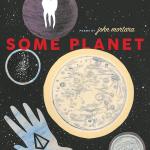Chelsea Werner-Jatzke: “spinning you in its gravity” – John Mortara’s Some Planet
Some Planet
John Mortara
YesYes Books, 2015
In issues of taxonomy Stephen J. Gould states, in his essay “Bully for the Brontosaurus,” “the dispute is only about names, not about things.” Only, in this context, is a word that rankles some, especially poets for whom the language of a thing is of importance.
John Mortara makes a subtle case against the proper nouning of the natural world in Some Planet, a book whose title can be read ironically with an eye roll, as in some planet you got there. Or with the enthusiasm of a kid in the 50’s, gee whiz that’s some planet. The Emersonian epigraph, which reads in part, “Know then, that the world exists for you: build, therefore, your own world,” implies another reading: any planet is a personal planet—the natural world is a thing to be built on your own.
Mortara’s stylistic choice of writing without capitol letters removes proper nounness but not thingness. Mortara imbues thingness onto the human body and human emotion onto things: the dripping kitchen sink that cannot help itself (in “your house becomes an angry mouth”) and the heart is “an unidentified failing object” (in “my heart is an alien spacecraft”).
This is more than just anthropomorphism. Mortara’s poems are what Charles Olson, father of projective poetry, says poems must be: “high-energy constructs and, at all points, an energy discharge.” Through the use of second person imperatives, Mortara makes the reader complicit in the creation of a specific planet among all possible planets.
Olson’s imperative is prevalent in the opening poem, “experiment,” in which the reader must make decisions and all outcomes are equally likely. Each choice made before leaving the house in the morning is left to the flip of a coin. Outside the front door of Some Planet, in the friction of competing possibilities, is the ripple of a heat wave:
this dreadful circumstance of birth / we could be
anywhere on this little planet / could build any
road / to any island / but we’re here / still sweating
This lament for specificity, from the poem “you pick a road,” is eased by Mortara’s use of the virgule within a poem already employing enjambment. This choice constructs a physical reality while also engaging in an all-too-fitting elliptical gesture. Potential readings multiply as possible outcomes orbit every decision made in life. In the course of Some Planet, these possible planets are charted:
your entire family dances around you
imagine this is a solar system
watch them soak-up the heat of your potential as if you were a campfire
you are now a campfire
(“red” 4-7)
she holds her hands to you and says you will grow into a great red sun
you are now that star again
you grow and you swell and you consume
the ellipse of them all around you
(“red” 14-18)
In the first half of the book, Mortara’s open form utilizes a set of poetic possibilities. In its second half, these forms become entropic. The reader is asked to physically provide order and alterations. “gideon’s bible hotel poem” is mad lib poetry while “paper fortune teller” asks that the page be cut out. Mortara has previously incorporated paper craft and interactive elements in publications such as the choose-your-own-adventure Small Creature / Wide Field (tNY Press) and the self-published digital chapbook if you like me i like you too?
Some Planets fits neatly into these modes. These poems break, bend, and resist natural law, only to make from this brokenness a new pattern, a transcendental taxonomy. The poetry recalls Olson’s description of poetic form and structure:
“It comes to this: the use of a man, by himself and thus by others, lies in how he conceives his relation to nature. . . . If he is contained within his nature as he is participant in the larger force, he will be able to listen, and his hearing through himself will give him secrets objects share. And by an inverse law his shapes will make their own way. . . . This is not easy. Nature works from reverence, even in her destructions (species go down with a crash).”
Mortara’s book contains its own nature. It participates in a larger force. It is a planet with no name that is necessarily understood as ours. We share in its secrets as Some Planet shifts tense and pronouns, moving along the spectrums of time and gender. But ultimately, we discover Some Planet to be unnamed, ungovernable:
well / god has no name / what’s even in a name / good question / everyone seems to ask but
never answer / here’s my take / at first / very little / a name is born / like a tiny christmas light
before long it grows into a giant star / spinning you in its gravity / and in this way / a name
can / and will / eat you alive / if you let it
(“Q&A” 8-11)
—
Chelsea Werner-Jatzke is a writer from NYC living in Seattle. She received her MFA from Goddard College, is a fiction editor at Pacifica Literary Review, and is editorial director at Conium Review. She is co-founder of Till, an annual writing retreat, and Lit.mustest, a reading series. Her writing has appeared or is forthcoming from H_NGM_N, Sonora Review, Monkeybicycle, Everyday Genius, Pif, Beecher’s Magazine, and Tupelo Quarterly, among others. chelseawernerjatzke.com

